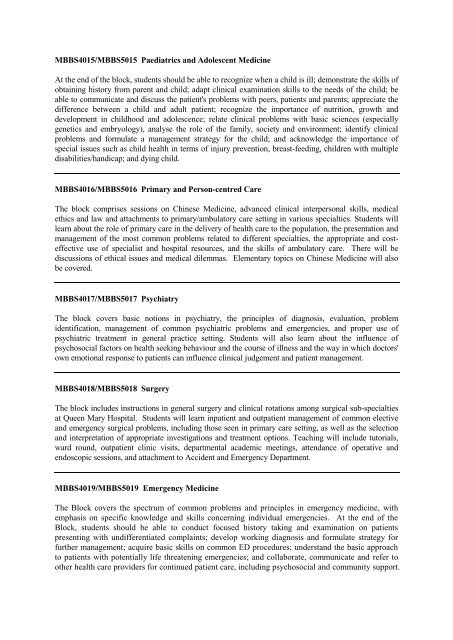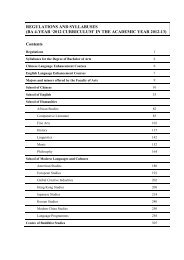(MBBS) (5-year-programme) - The University of Hong Kong
(MBBS) (5-year-programme) - The University of Hong Kong
(MBBS) (5-year-programme) - The University of Hong Kong
You also want an ePaper? Increase the reach of your titles
YUMPU automatically turns print PDFs into web optimized ePapers that Google loves.
<strong>MBBS</strong>4015/<strong>MBBS</strong>5015 Paediatrics and Adolescent MedicineAt the end <strong>of</strong> the block, students should be able to recognize when a child is ill; demonstrate the skills <strong>of</strong>obtaining history from parent and child; adapt clinical examination skills to the needs <strong>of</strong> the child; beable to communicate and discuss the patient's problems with peers, patients and parents; appreciate thedifference between a child and adult patient; recognize the importance <strong>of</strong> nutrition, growth anddevelopment in childhood and adolescence; relate clinical problems with basic sciences (especiallygenetics and embryology), analyse the role <strong>of</strong> the family, society and environment; identify clinicalproblems and formulate a management strategy for the child; and acknowledge the importance <strong>of</strong>special issues such as child health in terms <strong>of</strong> injury prevention, breast-feeding, children with multipledisabilities/handicap; and dying child.<strong>MBBS</strong>4016/<strong>MBBS</strong>5016 Primary and Person-centred Care<strong>The</strong> block comprises sessions on Chinese Medicine, advanced clinical interpersonal skills, medicalethics and law and attachments to primary/ambulatory care setting in various specialties. Students willlearn about the role <strong>of</strong> primary care in the delivery <strong>of</strong> health care to the population, the presentation andmanagement <strong>of</strong> the most common problems related to different specialties, the appropriate and costeffectiveuse <strong>of</strong> specialist and hospital resources, and the skills <strong>of</strong> ambulatory care. <strong>The</strong>re will bediscussions <strong>of</strong> ethical issues and medical dilemmas. Elementary topics on Chinese Medicine will alsobe covered.<strong>MBBS</strong>4017/<strong>MBBS</strong>5017 Psychiatry<strong>The</strong> block covers basic notions in psychiatry, the principles <strong>of</strong> diagnosis, evaluation, problemidentification, management <strong>of</strong> common psychiatric problems and emergencies, and proper use <strong>of</strong>psychiatric treatment in general practice setting. Students will also learn about the influence <strong>of</strong>psychosocial factors on health seeking behaviour and the course <strong>of</strong> illness and the way in which doctors'own emotional response to patients can influence clinical judgement and patient management.<strong>MBBS</strong>4018/<strong>MBBS</strong>5018 Surgery<strong>The</strong> block includes instructions in general surgery and clinical rotations among surgical sub-specialtiesat Queen Mary Hospital. Students will learn inpatient and outpatient management <strong>of</strong> common electiveand emergency surgical problems, including those seen in primary care setting, as well as the selectionand interpretation <strong>of</strong> appropriate investigations and treatment options. Teaching will include tutorials,ward round, outpatient clinic visits, departmental academic meetings, attendance <strong>of</strong> operative andendoscopic sessions, and attachment to Accident and Emergency Department.<strong>MBBS</strong>4019/<strong>MBBS</strong>5019 Emergency Medicine<strong>The</strong> Block covers the spectrum <strong>of</strong> common problems and principles in emergency medicine, withemphasis on specific knowledge and skills concerning individual emergencies. At the end <strong>of</strong> theBlock, students should be able to conduct focused history taking and examination on patientspresenting with undifferentiated complaints; develop working diagnosis and formulate strategy forfurther management; acquire basic skills on common ED procedures; understand the basic approachto patients with potentially life threatening emergencies; and collaborate, communicate and refer toother health care providers for continued patient care, including psychosocial and community support.
















